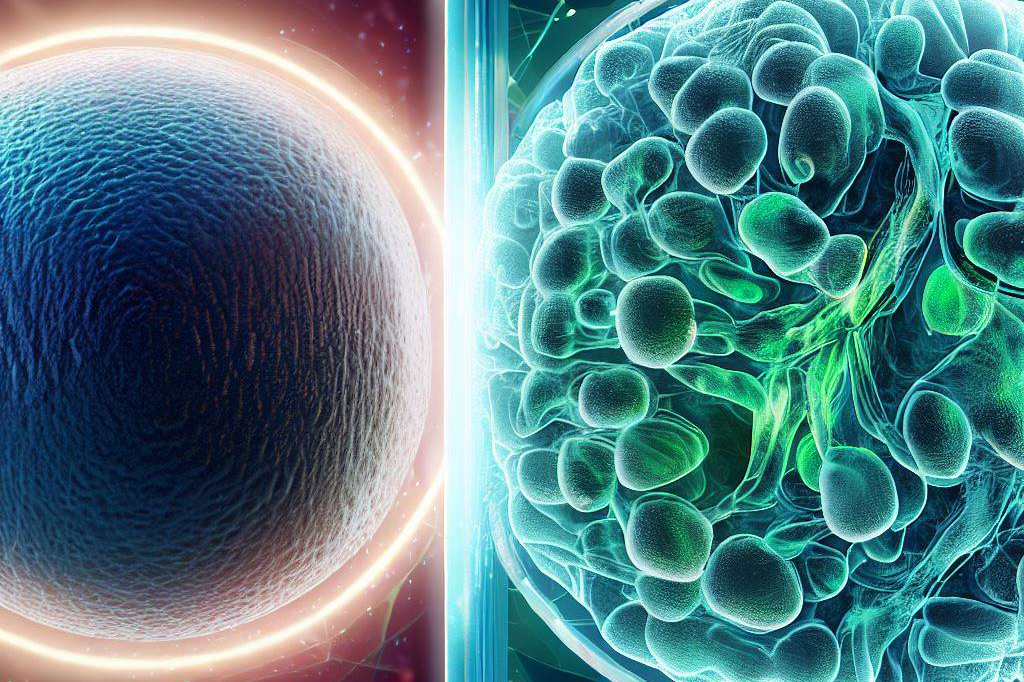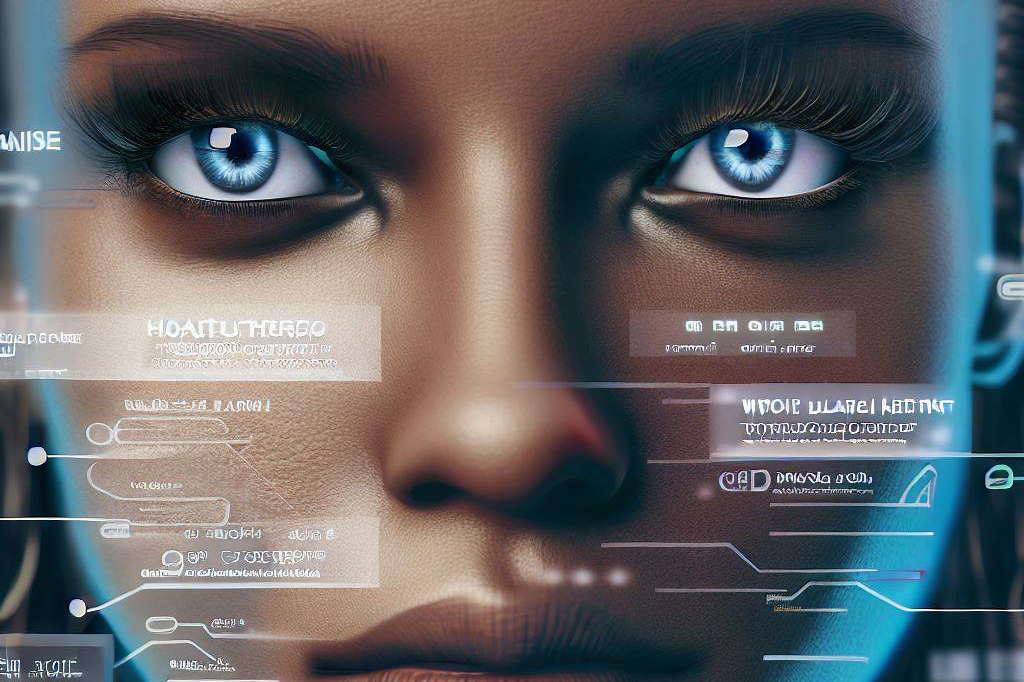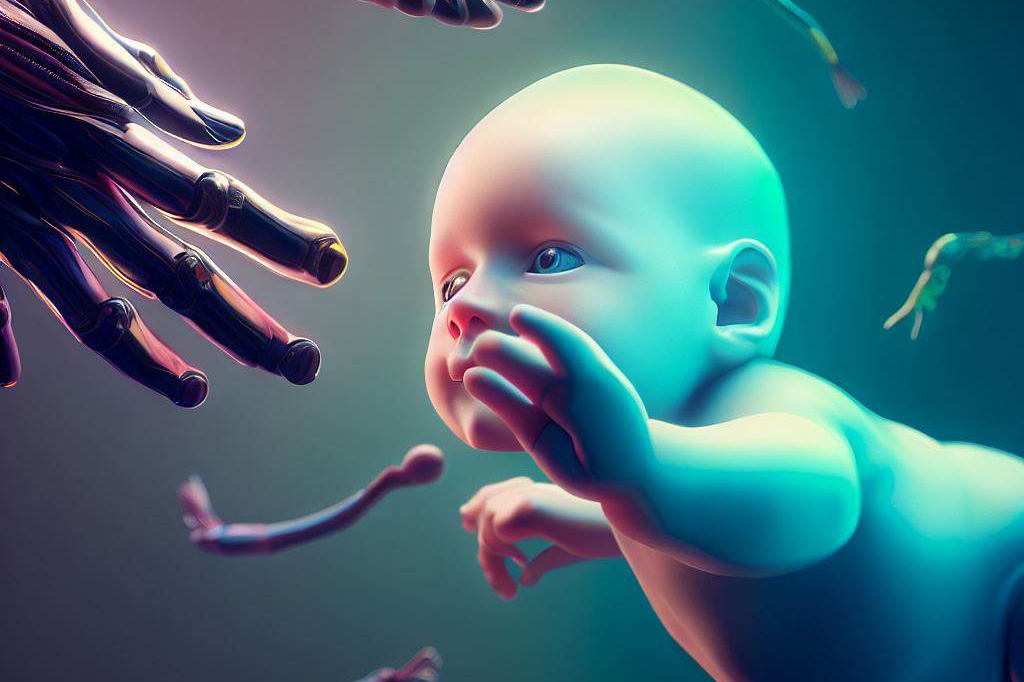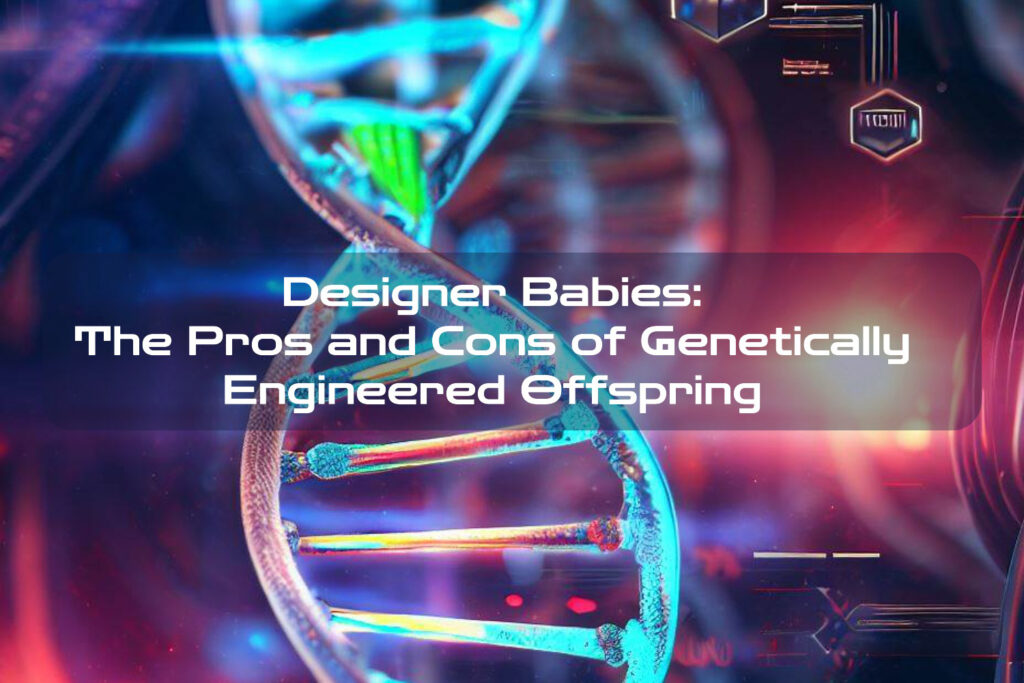The topic of designer babies is one that has been debated on a global scale. Designer babies are children who have been genetically engineered in vitro to include specific traits, such as enhanced physical or mental abilities, or to prevent genetic diseases.
While the idea of creating genetically perfect offspring may seem appealing, it raises many ethical concerns and can have profound long-term effects on society. In this article, we will examine the pros and cons of designer babies.
Definition of Designer Babies
Designer babies are offspring that have had their DNA manipulated through genetic engineering to produce specific traits or characteristics. This can be done through pre-implantation genetic diagnosis (PGD), a process where embryos are created in a lab and then screened for certain desired traits before being implanted into the mother’s womb. This technology allows for the selection of embryos that carry favorable genetic traits while discarding those with unwanted traits.
Brief History of Genetic Engineering and Its Impact on Society
Genetic engineering has been around since the 1970s, when scientists first began manipulating genes to create organisms with desirable traits. Since then, advances in technology have allowed for more precise manipulation of genes, which has led to the possibility of creating designer babies. The impact of genetic engineering on society has been significant.
It has allowed for the development of vaccines, gene therapies, and other medical treatments that were once thought impossible. However, it has also raised many ethical concerns surrounding issues such as privacy rights and discrimination against those who do not have access to genetic modification technology.
Importance of Discussing the Pros and Cons of Genetically Engineered Offspring

The creation of designer babies raises many important questions about ethics, social justice, and human nature itself. While the potential benefits of creating genetically engineered offspring are significant, it is important to consider the potential risks and drawbacks as well. A full discussion of the pros and cons of designer babies will help inform public policy and ensure that this technology is used in a responsible and ethical manner.
Pros of Designer Babies
Prevention of Genetic Diseases: A Medical Miracle?
One of the most significant benefits of designer babies is the ability to prevent genetic disorders before they occur. By genetically modifying embryos before implantation, doctors can test for and eliminate potentially life-threatening diseases such as cystic fibrosis, sickle cell anemia, and Huntington’s disease.
This method allows parents to ensure that their child does not inherit a debilitating condition and can live a healthy life. However, critics argue that this process raises significant ethical concerns.
Some believe that eliminating certain genes could lead to the elimination of diversity within the human gene pool. Others argue that this technology could be used to create “designer” children with specific genetic traits, essentially creating a new form of eugenics.
Enhancement of Physical and Mental Traits: Are We Playing God?
Another potential benefit of designer babies is the ability to enhance physical and mental traits. This includes features such as height, eye color, intelligence level, athletic ability, and more. While some argue that this could create a society in which only those who can afford these enhancements are considered “successful”, others see it as an opportunity for people to reach their full potential.
However, there are significant ethical concerns surrounding the idea of “playing God” with human genetics. Critics worry about parents choosing certain traits or characteristics for their child based on societal norms or biases rather than individual choice or natural selection.
Increased Lifespan and Quality of Life: A Dream Come True?
Designer babies also have the potential to increase their lifespan and overall quality of life by reducing their susceptibility to diseases or illnesses later in life. By identifying specific genetic markers associated with conditions like cancer or Alzheimer’s disease before birth, doctors can take preventative measures early on in life.
While this may seem like a dream come true for many, it raises the question of whether or not extending human life is something that should be pursued. Some argue that it could lead to overpopulation and put a strain on resources, while others see it as an opportunity to pursue new scientific breakthroughs.
Improved Compatibility with Organ Transplantation: A Life-Saving Solution?
Designer babies may have the potential to improve compatibility with organ transplantation. By identifying specific genetic markers associated with organ rejection or compatibility before birth, doctors can help ensure that those in need receive a compatible organ transplant.
While this technology could save countless lives, critics worry about the potential for discrimination against those who cannot afford genetic modifications or for those who do not possess certain desirable traits. It also brings up questions about what happens if there are not enough genetically modified donors available.
While the potential benefits of designer babies are significant, there are also significant ethical and societal concerns that must be considered. As technology continues to advance, it is important for us as a society to have open and honest discussions about the implications and consequences of genetic engineering.
Ethical concerns surrounding the creation of “perfect” humans

One of the major ethical concerns surrounding designer babies is the possibility of creating “perfect” humans. While this might seem like a desirable outcome, it raises several serious ethical questions. For example, who gets to decide what “perfection” looks like?
Should we be able to engineer traits that are considered desirable in one culture, but not in another?
And what impact will this have on society as a whole?
Another concern is the potential for eugenics – the idea that we can selectively breed humans to improve certain traits. This has been tried before, with disastrous consequences.
The eugenics movement of the early 20th century led to forced sterilizations and other violations of human rights. While modern genetic engineering is not inherently eugenic, it could be used for eugenic purposes if left unchecked.
There is concern about how genetically engineered individuals will be viewed by society.
Will they be seen as superior or inferior to those who are not genetically engineered?
Will they face discrimination or prejudice?
These are all important questions that need to be considered before we move forward with designer babies.
Potential for discrimination against those who are not genetically engineered

One of the biggest concerns about designer babies is that it will create a caste system within society – those who can afford genetic engineering and those who cannot. This could lead to widespread discrimination against those who are not genetically engineered, as they may be viewed as inferior or less desirable.
There is also concern about access to healthcare and other services for those who are not genetically engineered. Will insurance companies refuse coverage for individuals who do not meet certain genetic criteria?
Will employers discriminate against job candidates based on their genetics? These questions raise serious issues about social justice and equity that need to be addressed before we move forward with genetic engineering.
Unknown long-term effects on the human genome and environment
Another concern about designer babies is the potential for unintended consequences. While we may be able to engineer certain traits with precision, there is still much we don’t know about the long-term effects of genetic engineering on the human genome and environment. For example, what will happen if genetically engineered individuals pass their modified genes down to their children?
Will these children be at risk for genetic disorders or other health problems? And what impact will genetically engineered organisms have on the environment?
These are all important questions that need to be addressed before we move forward with designer babies. We must take a cautious approach and thoroughly research the potential risks before implementing this technology.
Financial barriers to access this technology

One of the most significant concerns about designer babies is that it will only be available to those who can afford it. Genetic engineering is likely to be an expensive process, which means that only wealthy individuals will have access to it. This raises serious issues about equity and social justice.
Will we create a society where only the rich have access to desirable traits like intelligence and physical prowess? What impact will this have on social mobility and equality?
It’s important that we consider these questions carefully before moving forward with genetic engineering. We must ensure that everyone has equal access to this potentially life-changing technology, regardless of their socioeconomic status.
Prevention of Genetic Diseases: Hope for a Healthier Future
Preventing genetic diseases is one of the most promising aspects of genetic engineering. With the ability to identify and eliminate harmful genes, children can be born without the risk of developing debilitating or life-threatening conditions.
This process begins with in vitro fertilization (IVF), in which an egg is fertilized outside of the body and then screened for specific genetic mutations. Once a mutation has been identified, another healthy embryo can be implanted into the mother’s uterus.
An example of this process in action is cystic fibrosis (CF), a genetic disorder that affects roughly 30,000 people in the United States alone. CF causes mucus to build up in organs such as the lungs and pancreas, leading to life-threatening complications.
However, with gene editing technology such as CRISPR-Cas9, scientists have been able to remove this faulty gene from embryos before implantation, effectively eradicating CF from future generations. Despite these technological breakthroughs, there are also ethical implications that must be considered.
One concern is that eliminating certain genes may reduce genetic diversity and lead to unintended consequences down the line. Furthermore, there are concerns over who will have access to these technologies and how they will be regulated.
Enhancement of Physical and Mental Traits: The Slippery Slope

In addition to preventing disease, genetic engineering also holds promise for enhancing physical and mental traits. This could include increasing intelligence, athleticism, or even altering physical appearance.
While this may sound like science fiction come true, it raises serious ethical questions about what constitutes “perfection.” One type of physical enhancement that has garnered attention recently is height augmentation through gene therapy.
This procedure involves injecting a synthetic version of a gene called insulin-like growth factor 1 (IGF-1) into an individual’s muscles or bones to stimulate bone growth. However, this procedure is still largely experimental and carries significant risks, including cancer and joint problems.
In regards to mental enhancement, there is limited understanding of the genetics behind intelligence and personality traits. Additionally, any attempt to alter these traits raises concerns about creating a “superior” class of humans who may be granted unfair advantages over others.
Increased Lifespan and Quality of Life: A Double-Edged Sword
Another potential benefit of genetic engineering is the ability to increase lifespan and improve quality of life. Studies have shown that certain genes can impact longevity and susceptibility to age-related diseases such as Alzheimer’s.
By identifying and altering these genes, it may be possible to extend the human lifespan significantly. However, extending life may come at a cost.
As populations age, there are concerns about strains on resources such as healthcare systems. Additionally, living longer does not necessarily equate to a higher quality of life if individuals are suffering from chronic illnesses or disabilities.
There are also societal implications to consider. If only the wealthy have access to gene editing technologies that extend lifespans or prevent disease, it could further exacerbate existing inequalities between socioeconomic classes.
Improved Compatibility with Organ Transplantation: A Solution for a Growing Crisis

Organ transplantation is a crucial aspect of modern medicine but it can often be difficult due in part to compatibility issues between donors and recipients. However, with genetic engineering technology it may be possible to eliminate these barriers altogether by creating compatible organs from stem cells derived from the patient’s own genetic material.
While this technology shows tremendous promise in addressing organ shortages around the world, there are still significant hurdles that must be overcome before it can become widely available. These include perfecting techniques for growing organs from stem cells as well as navigating ethical considerations around using human embryos for research purposes.
Additionally, concerns have been raised about the long-term impact on society if there were an abundance of organs available for transplantation. This could potentially lead to a rise in risky behaviors or reduced incentives for healthy living if individuals know that they have access to replacement organs.
Final Thoughts
Genetically engineering offspring is a controversial and thought-provoking subject that has sparked debates worldwide. It is clear that designer babies have numerous potential advantages and disadvantages.
While the ability to eliminate genetic diseases and enhance physical and cognitive traits may bring great benefits, there are ethical concerns around creating “perfect” humans. Additionally, the long-term effects of genetic engineering on the human genome and environment are unknown.
The pros of designer babies include disease prevention, enhanced traits, an increased lifespan and quality of life, as well as improved compatibility with organ transplantation. However, creating genetically engineered offspring also raises ethical concerns, such as discrimination against non-genetically engineered individuals. The long-term consequences of genetic modification on humans remain uncertain.
Personal opinion on designer babies as a concept
As a member of society, I believe that genetically engineering offspring should be approached with caution. While there may be some advantages to this process in terms of disease prevention or trait enhancement, altering human genetics can lead to unforeseen consequences that could have severe repercussions for future generations. Furthermore, creating “perfect” humans could create societal pressure to conform to certain standards rather than celebrating diversity.
Future implications for society if designer babies
Looking ahead at the future implications of designer babies in society raises many questions about its impact on humanity at large. For instance: how will we define normalcy or exceptionalism once we have control over our genetic makeup? Will there be a divide between those who can afford genetic modification technology and those who cannot?
What would this mean for issues related to social justice? These questions require careful consideration by policymakers before making any decisions about implementing this technology.
While there may be some potential benefits to designing your own children’s genetics, like disease eradication or enhanced traits like intelligence or athleticism, genetic engineering raises ethical concerns that cannot be ignored. It remains to be seen whether the benefits outweigh the risks of using designer babies as a means to improve human life.
FAQ: Designer Babies: The Pros and Cons of Genetically Engineered Offspring
1. What are designer babies?
– Designer babies refer to offspring whose genetic makeup has been intentionally modified or engineered to possess specific traits or characteristics.
2. How are designer babies created?
– Designer babies are created through a process known as genetic engineering or genetic modification. This involves altering the genes or DNA of embryos using techniques like CRISPR-Cas9 to introduce or remove specific genes associated with desired traits.
3. What are the potential benefits of designer babies?
– Designer babies offer the potential for various benefits, such as:
– Reduced risk of genetic diseases: Genetic engineering can help eliminate or reduce the risk of inheriting certain genetic disorders, thereby improving the overall health and well-being of future generations.
– Enhanced intelligence and cognitive abilities: Through targeted gene modifications, it may be possible to enhance intellectual capabilities and cognitive functions, potentially leading to advancements in fields such as science, medicine, and technology.
– Improved physical traits: Genetic engineering could enable the enhancement of physical attributes like height, strength, and athleticism, which may have positive implications in sports and other physical endeavors.
4. What are the ethical concerns surrounding designer babies?
– The concept of designer babies raises several ethical concerns, including:
– Unequal access: Genetic engineering technologies may create a divide between those who can afford the enhancements and those who cannot, leading to societal inequality and discrimination based on genetic traits.
– Interference with nature: Critics argue that manipulating the genetic makeup of individuals interferes with the natural process of reproduction and could have unintended consequences on the diversity and evolution of the human species.
– Unknown long-term effects: Since genetic engineering in humans is a relatively new and rapidly advancing field, the long-term effects and potential risks associated with modifying the human genome are not yet fully understood.
5. Are there any legal regulations regarding designer babies?
– The regulations regarding designer babies vary across countries and jurisdictions. In some regions, there may be restrictions or outright bans on certain types of genetic modifications in humans. It is crucial to consult the specific laws and guidelines of the country or region where such procedures are being considered.
6. Can designer babies be used to select the gender of a child?
– Yes, genetic engineering techniques could potentially be utilized to select the gender of a child. However, the ethical implications and legal restrictions surrounding gender selection vary across different countries and cultures. It is essential to be aware of the local regulations and ethical guidelines governing this practice.
7. What are the potential risks associated with designer babies?
– Some potential risks associated with designer babies include:
– Off-target effects: Genetic modifications may have unintended consequences, leading to unforeseen health issues or complications later in life.
– Loss of genetic diversity: Widespread use of genetic engineering could result in a reduction of genetic diversity within the human population, potentially making it more susceptible to certain diseases or environmental challenges.
– Psychological and societal impacts: The notion of creating genetically modified humans could have significant psychological and social impacts, raising concerns about identity, discrimination, and the overall concept of what it means to be human.
8. Can designer babies be used to create “perfect” individuals?
– The idea of creating “perfect” individuals through genetic engineering is highly subjective and contentious. Genetic modifications can only address specific traits and characteristics, and what may be considered “perfect” varies among individuals and cultures. It is essential to approach the concept of designer babies with caution and consideration of the broader ethical implications.
9. Is genetic engineering limited to physical traits, or can it also impact intelligence and personality?
– While genetic engineering has the potential to influence physical traits, such as appearance and physical abilities, the impact on complex traits like intelligence and personality is not yet fully understood. These traits are influenced by a combination of genetic, environmental, and social factors, making it challenging to isolate and modify specific genes responsible for such characteristics.
10. Are there any alternative approaches to designer babies?
– Yes, there are alternative approaches to designer babies that do not involve genetic engineering. One such approach is preimplantation genetic diagnosis (PGD), which allows for the screening of embryos for specific genetic diseases before implantation during in vitro fertilization (IVF). This technique helps identify embryos that are free from certain genetic disorders but does not involve modifying the genetic makeup of the embryos.

C M, a seasoned editor, journalist, and consultant, is deeply fascinated by the convergence of technology, space, and the future of humanity.
With a particular interest in transhumanism, futurology, and the philosophical and ethical dimensions of these domains, C M serves as the lead contributor to TranscendSphere and SpaceSpotlight.
When not penning insightful articles on these rapidly evolving fields, C M indulges in their love for podcasts and books, proudly embracing their status as a ‘Happy Nerd Extraordinaire!’





